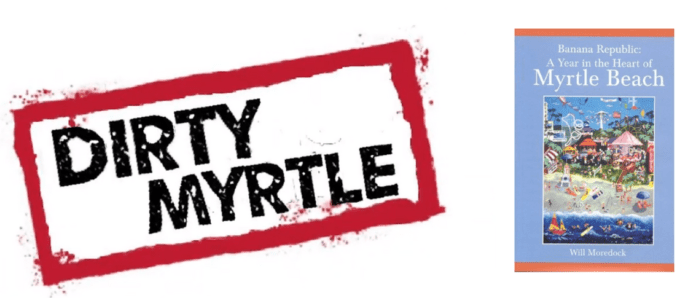As we publish today, December 28, 2021, it is 70 degrees in the City of Myrtle Beach.
Despite the great weather, questions are being asked if the City of Myrtle Beach can finally overcome its Dirty Myrtle tag in 2022.
Charles Herrick is famously quoted, “To fundamentally solve a problem, we must understand it’s cause. In that I mean the chain of actions or circumstances that led to the problem–rather than only the immediate cause, which serves only to place blame.”
5 Unsuccessful Ways Myrtle Beach Tried To Kill The Dirty Myrtle Tag
Does the city have a full grasp on why it has been tagged Dirty Myrtle? Some leaders say it has to do with crime. Others say it is because of the retailers along the boulevard. City staff have also blamed the tourists. While the majority of elected city officials blame run down, poorly kept hotels and businesses in the downtown district.
Have they missed the mark on why Myrtle Beach is called Dirty Myrtle entirely?
Myrtle Beach
Here are 5 expensive, unsuccessful ways Myrtle Beach has attempted to change the “Dirty Myrtle” narrative.
- The DRC – The downtown redevelopment corporation was a 20 year experiment by the City of Myrtle Beach. This $20 million effort only led to shutting down businesses the city targeted. The city now faces a myriad of lawsuits because of those efforts.
- The TDF – The tourism development fee was legislation created by then Representative Alan Clemmons and S.C. Senator Luke Rankin to fund the Myrtle Beach Area Chamber of Commerce for advertising purposes. In 2008, America was fully entering the age of brand, however. While a lack of options (caused by Covid) drove millions to Myrtle Beach in 2021, the TDF has not proven the most effective method for changing the city’s tarnished brand. It does, however, allow tourists to pay for locals’ real estate taxes. This tax transfer keeps the locals happy. Per former Myrtle Beach Area Chamber of Commerce C.E.O. Brad Dean, only 30% of all tourists marketed return to the City of Myrtle Beach the following year.
- Deny Storm Water Concerns – In our own reporting MyrtleBeachSC News, almost a decade ago using DHEC numbers, exposed the reality that the city refused to invest in critical storm-water infrastructure over the past 80 years. Leaking and collapsing city pipes continue to cause high ecoli readings at drainage areas along the beach. First the city denied the problem. No one bought that narrative. After years of denial, the city worked with DHEC to change the numbers to 5 year averages. Now, neither tourists nor locals can know exactly what any given day’s ecoli ratings are along drainage areas.
- Buy Off Local Media – After the TDF passed, the Myrtle Beach Area Chamber of Commerce chose to pay each local, corporate news outlet $1 million annually. The puff pieces written by local media, however, are largely ignored by visiting tourists and established locals.
- Deny Crime – The City of Myrtle Beach has a higher crime rate than all other Grand Strand towns combined. The city averages almost one shooting every week, 52 weeks out of the year. Elected officials continue to collectively express that Myrtle Beach does not have a crime issue, however.
UNDERSTANDING THE ROOT OF THE PROBLEM
In 2004, Will Moredock wrote an expose on the underlying factor causing Myrtle Beach to be tagged “Dirty Myrtle”.
In three words, the problem can be summed up as corrupt city government.
The Amazon tag line for the book reads: A history of Myrtle Beach and an analysis of the corrupting influence of 14 million tourists and $5 billion a year on this small, southern town. Also included is report on environmental destruction due to overdevelopment in fragile coastal environment, a history of golf in Myrtle Beach, a report on the city’s ugly race relations, a report on the two annual motorcycle rallies, report on spring break, report on teenage runaways who flock to MB, report on political corruption.
As Moredock reports, the underlying problem is a culture of corrupt, local city government.
Until that problem is corrected, the Dirty Myrtle tag is likely to remain.


